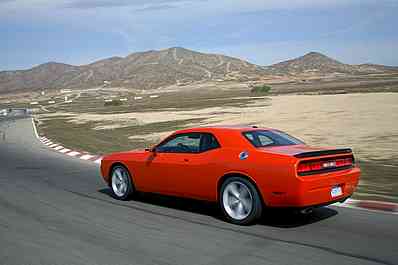The all-new 2009 Dodge Challenger offers more than 25 safety and security
features including:
Advanced multi-stage air bags: Inflate with a force appropriate to
the severity of an impact brakes to slipping wheels; reduces excess engine
torque until traction is regained
Anti-lock Brake System (ABS): Senses and prevents wheel lockup, offering
improved steering control under extreme braking and/or slippery conditions
- advanced ABS modulates the four brakes individually for optimum control
and stopping performance
Auto-reverse sun roof: Advanced sensing system automatically engages
and reverses the sun roof to the open position
BeltAlert: Periodically activates a chime and illuminates an icon
in the instrument cluster to remind the driver to buckle up if a vehicle
is driven without the driver being properly belted
Brake Assist: In a panic brake condition, the system applies maximum
braking power, providing the shortest possible stopping distance
Brake/park interlock: Prevents an automatic transmission from being
shifted out of “Park” unless the brake pedal is applied
Child seat anchor system: Lower Anchors and Tethers for CHildren (LATCH)
is designed to ease installation of compatible aftermarket child seats
Crumple zones: Designed to compress during an accident in order to
absorb energy from an impact which decreases transfer of that energy to occupants
Electronic Stability Program (ESP): Enhances driver control and helps
maintain directional stability under all conditions. Provides the greatest
benefit in critical driving situations such as turns and is especially valuable
when driving on mixed-surface conditions including snow, ice or gravel. If
there’s a discernible difference between what the driver asks through
the steering wheel and the vehicle’s path, ESP applies selective braking
and throttle input to put the vehicle back on to the driver’s intended
path
Energy-absorbing steering column: The manual-adjust steering column
utilizes two hydroformed coaxial tubes that move relative to each other in
order to allow the column to move forward for enhanced energy absorption
during an impact
Enhanced Accident Response System (EARS): Makes it easier for emergency
personnel to see and reach occupants in the event of an accident by turning
on interior lights and unlocking doors after air-bag deployment. Also shuts
off the flow of fuel to the engine
High-intensity Discharge (HID) headlamps: Provide approximately three
times the light output of conventional reflector lamps for improved night-time
illumination
Hill Start Assist (HSA): Standard on all Dodge Challengers with a
manual transmission. Assists drivers when starting a vehicle from a stop
on a hill by maintaining the level of brake pressure applied for a short
period of time after a driver’s foot is removed from the brake pedal.
If throttle is not applied within a short period of time after the driver’s
foot is removed from the brake pedal, brake pressure will be released
HomeLink® universal home security system transceiver: Stores three
separate transmitter radio-frequency codes to operate garage-door openers,
security gates, security lighting or other radio-controlled devices Interior
head-impact protection: Interior pillars above the belt line and instrument
panel, including areas around windshield and rear window headers, roof and
side-rail structures are specifically designed to limit head-impact force
Inside emergency trunk release: A glow-in-the-dark release handle, which
may be activated in the event of an adult or child being inadvertently trapped
inside the trunk
Knee bolsters: The lower instrument panel and the glove-box door are
designed to properly position the occupant, enabling air bags to work more
effectively
Remote Start: Conveniently starts the engine from outside the vehicle
by using the key fob while maintaining vehicle security Remote keyless entry:
Locks and unlocks doors, and turns on interior lamps. If the vehicle is equipped
with a vehicle-theft security alarm, the remote also arms and disarms that
system
Safety cage body structure: Protects occupants by managing and controlling
energy in the event of an impact
 Seat belt guide: Allows for optimal positioning
of seat belt across shoulder and chest Seat belt guide: Allows for optimal positioning
of seat belt across shoulder and chest
Seat belt pretensioners: During a collision, impact sensors initiate
front seat belt pretensioners to immediately remove slack from seat belts,
thereby reducing the forward movement of occupants’ heads and torsos
Sentry Key® engine immobilizer: Utilizes an engine key that has
an embedded transponder with a pre-programmed security code to discourage
vehicle theft. When the key is inserted into the ignition, the controller
sends a random number to the transponder and the engine is allowed to start.
If an incorrect key is used, the engine will shut off after only a few seconds
Side guard door beams: Provide occupant protection during a side impact
Supplemental side-curtain air bags: Extend protection to all outboard
front- and rear-seat passengers. Each side air bag has its own impact sensor
in order to autonomously trigger the air bag on the side where an impact
occurs
Tire Pressure Monitoring (TPM): Pressure-sensor modules within the
valve stems of all four road wheels and spare tire send continuous radio
frequency signals to a receiver and the system informs the driver when tire
pressure is too low
uconnect phone: Uses Bluetooth® technology to provide voice-controlled
wireless communication between the occupants’ compatible mobile phones
and the vehicle’s onboard receiver
Vehicle theft security alarm: Deters vandalism and theft, frequently
lowering insurance premiums. System protects the vehicle from theft by monitoring
door-ajar switches and the ignition circuit for unauthorized entry |

